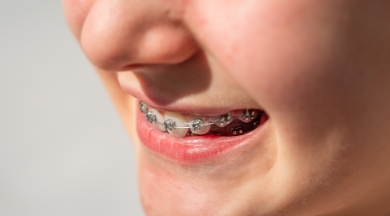The golden period for children's orthodontics is between the ages of seven and twelve. Missing this golden period, as highlighted by pediatric dentists in Macau, can potentially complicate the treatment. If the following three major bite issues are detected during the child's transitional dentition phase, it is advisable to consult a pediatric dentist for early assessment and appropriate orthodontic treatment to address these problems.
Rrefers to the condition where the lower teeth bite in front of the upper teeth and can be classified into mild and severe cases. In severe cases of crossbite, in addition to orthodontic treatment, jaw surgery may be necessary to correct the alignment of the jawbones.
Refer to the condition where the upper front teeth stick out further than the lower teeth. The causes can be attributed to both genetic factors and certain habits, such as prolonged pacifier use.
refers to a condition where there is insufficient space in the dental arch to accommodate all the teeth properly. This can result in teeth being misaligned, overlapped, or rotated.

Children who undergo orthodontic treatment are often fitted with traditional braces that consist of individual metal brackets adhered to the surface of the teeth. These braces need to be worn 24 hours a day and may have a slightly less appealing appearance. They can also potentially cause irritation to the gums.

Children's orthodontists customize orthodontic appliances specifically for children. Children are required to remove, wear, and clean their orthodontic appliances daily. Throughout the entire treatment process, the children's orthodontist closely monitors their progress.
Q
How long can the effects of teeth whitening be maintained?
A
The effects of blue light teeth whitening are generally stable and long-lasting. However, several factors can influence the effectiveness of teeth whitening, such as genetic factors, lifestyle and dietary habits, aging leading to tooth discoloration, smoking, and the impact of medications, among others. Therefore, the duration of having white teeth can vary from person to person.
Q
Does teeth whitening cause sensitivity?
A
The effects of blue light teeth whitening are generally stable and long-lasting. However, several factors can influence the effectiveness of teeth whitening, such as genetic factors, lifestyle and dietary habits, aging leading to tooth discoloration, smoking, and the impact of medications, among others. Therefore, the duration of having white teeth can vary from person to person.
Q
Does teeth whitening harm the teeth?
A
Teeth whitening agents contain carbamide peroxide and fluoride. Multiple studies have confirmed their effectiveness in reducing tooth decay, alleviating sensitivity, and promoting overall dental health. Therefore, teeth whitening, in fact, benefits the teeth.
Appointment Hotline:68460666
09:00 – 20:00 (Mon - Sat)
10:00 – 20:00 (Mon - Sat)
12:00 – 18:00 (Sun)
Copyright 2021 © We Care Dental Center